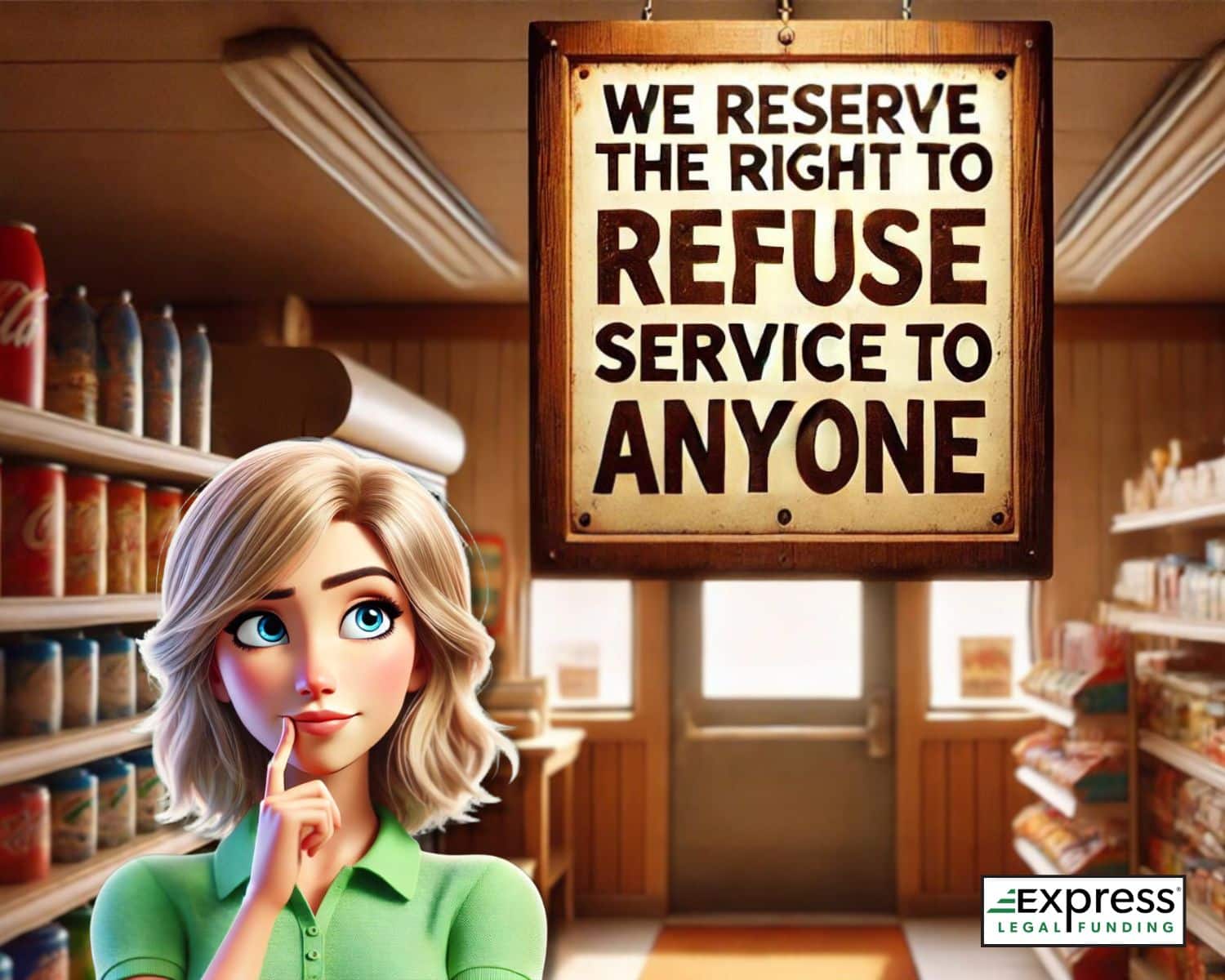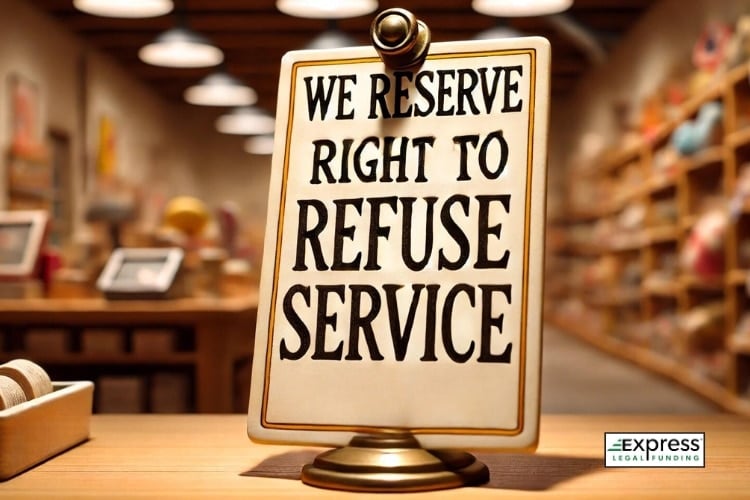
In today’s diverse and dynamic marketplace, the question of whether a business can refuse service to a customer is both relevant and complex.
This article aims to provide store customers and restaurant goers with a comprehensive understanding of the legal landscape surrounding service refusal and whether a “We reserve the right to refuse service to anyone” sign is legal in the first place.

By being aware of your derechos civiles and the legal protections available to you as a store customer or guest of a restaurant, you can navigate situations where service refusal may occur and take appropriate action when necessary.
Can a Business Refuse Service to Anyone for Any Reason?
Yes, in the United States, businesses have the right to refuse service to anyone, but there are some limits. Businesses can’t refuse service to someone based on discrimination against protected classes.
Federal, state, and local laws prohibit discrimination based on protected characteristics such as race, color, religion, sex, national origin, disability, and, in some jurisdictions, sexual orientation and gender identity.
Lawful vs. Unlawful Business Discrimination Against Customers
Businesses can refuse service for legitimate reasons such as dress code violations, disruptive behavior, or health and safety concerns, provided these reasons are applied consistently and do not discriminate against protected classes.

Racial profiling is never a valid reason for a business to refuse service or treat customers with one skin color differently from another.
This has recently occurred at some banks, giving rise to an increased awareness of the concept known as “banking while black,” as is discussed in this video about a lawsuit against a bank for discrimination.
What Are Legitimate Reasons Businesses Can Refuse Service?
While both big corporations and private businesses cannot refuse service based on discriminatory reasons, there are several legitimate grounds on which a business may refuse service:

Common Valid Reasons Why a Business Can Refuse Service
- Dress Code Violations: Businesses have the right to set their own rules of service and establish dress codes, asking customers who do not comply with them to leave. For example, a high-end restaurant may require patrons to wear formal attire, and a gym may prohibit customers from wearing certain types of footwear for safety reasons.
- Disruptive Behavior: Businesses can refuse service to customers who are disruptive, threatening, or engaging in illegal activities. This includes customers who are intoxicated, causing a disturbance, or violating the business’s code of conduct.
- Robo: Businesses, such as retail stores, can ban customers caught shoplifting as long as no illegal discriminatory practices are involved.
- Health and Safety Concerns: Businesses can refuse service to customers who do not comply with health and safety measures threatening the well-being of customers and employees, provided they are applied consistently and do not discriminate against protected classes.
- During Closed Hours: Businesses can refuse to service customers when they are closed. However, things can get legally sticky if a business makes a special exception about opening up for specific customers after hours but not others.
- Reached Maximum Occupancy: Businesses can refuse service to customers if they’ve already reached maximum occupancy, which is an integral part of fire and evacuation safety. For example, it’s not discrimination for a nightclub or restaurant to prevent people from entering if it has already reached the maximum number of people allowed inside at one time or all of the tables are already full.
- Tickets Sold Out: Organizations such as sports teams and movie theaters can refuse service if all tickets for a particular show or event have been pre-ordered or sold out.
- Out-of-Control Service Animals: Under the ADA, businesses must permit service animals to accompany individuals with disabilities. However, if a service animal is out of control, posing a direct threat to the safety of others, the business may ask the individual to remove it.
The Legal Framework for When Businesses Can and Can’t Refuse Service to Customers
A combination of federal, state, and local laws governs the ability of a business to legally refuse service to customers in the United States. At the federal level, several key statutes play a crucial role in dictating when it is and is not allowed:
Civil Rights Act of 1964
The Civil Rights Act of 1964, a landmark piece of federal legislation in the history of the United States, prohibits discrimination based on race, color, religion, or national origin.

Title II of the Act specifically addresses places of public accommodation. It makes it illegal for restaurants, gas stations, sports arenas, theaters, hotels, motels, and all other public accommodations involved in interstate commerce to refuse service based on these protected characteristics (race, color, religion, or national origin).
Discrimination on the basis of sex is not included in Title II.
Americans with Disabilities Act (ADA)
Enacted in 1990, the ADA prohibits discrimination against individuals with disabilities in all areas of public life, including businesses.

This means that businesses must provide reasonable accommodations to customers with disabilities and cannot refuse service based on disability alone.
State Anti-Discrimination Laws
45 states have enacted their own anti-discrimination laws addressing public accommodations, providing additional protections beyond those offered by federal law, and prohibiting refusal of service on the basis of sex.
While the protected classes vary among states, many states have nondiscrimination laws prohibiting businesses from refusing service based on the following:
- Sexual orientation
- Gender identity
- Pregnancy status
- Veteran status
- Military status
- Edad

The five states without public accommodation laws (for people without a disability) include:
5 States Without Public Accommodation Laws
High-Profile Cases and Legal Precedents for the Right to Refuse Service
Several high-profile cases have brought attention to the issue of businesses refusing service to customers and have helped shape the legal landscape:
Masterpiece Cakeshop v. Colorado Civil Rights Commission
In this 2017-2018 Supreme Tribunal case, Masterpiece Cakeshop, a Lakewood, Colorado bakery, refused to design a custom wedding cake for a gay couple, with the bakery owner citing their religious beliefs against same-sex marriage.

En Court ruled in favor of Masterpiece Cakeshop, but the decision was narrowly focused on the specific facts of the case and did not establish a broad right for businesses to refuse service based on religious beliefs.
Red Hen Restaurant Controversy
In 2018, the Red Hen restaurant in Lexington, Virginia, refused service to then-White House Press Secretary Sarah Sanders, citing the owner’s opposition to the Trump administration’s policies.
This incident sparked negative headlines and a national debate about the rights of businesses to refuse service based on political beliefs.

From a legal perspective, the restaurant lawfully refused service as Virginia state law does not protect the trait of political affiliation against discrimination.
The Red Hen closed at the end of 2023 for a rebrand and has since reopened as a new restaurant under the same owners, called Zunzun, serving small plates, wine, whiskey, and cocktails.
COVID-19 Vaccine Mandates and Passports
The pandemic introduced new legal questions about service refusal related to vaccination status. Some businesses have implemented vaccine mandates for customers.
While not prohibited under the Civil Rights Act of 1964, some states, such as Florida and Texas, have banned businesses from preventing customers who have not received a COVID-19 vaccination from accessing certain goods and services.
303 Creative, LLC v. Elenis
In 2023, the US Supreme Court ruled 6-3 in favor of Colorado graphic designer Lorie Smith, who refused to build a custom website for a same-sex couple’s wedding.

Smith and her abogados argued that Colorado’s anti-discrimination law violated her First Amendment right to free speech and that the state could not force her to express a view that went against her devoutly held religious beliefs.
The Court found that Smith’s design services are “expressive” and that she qualifies for constitutional protection.
The ruling says the First Amendment to the US Constitution protects an individual’s right to speak their mind, allowing businesses offering “expressive” services to discriminate against a protected class for freedom of speech.
The government, in this case, the state of Colorado, can’t force someone to speak in a way that defies their conscience.
The decision has been seen as a setback for LGBTQ+ protections and a victory for free speech and religious liberty advocates.
What Should I Do If I Believe a Business Unlawfully Refused me Service?
As a customer, it is essential to understand the rights and the legal protections available to you.

Here are some critical steps you can take if you are unlawfully refused service by a business:
- Document Incidents: If you believe a business has unlawfully refused to service you as a customer, it is crucial to document the incident as evidence. This includes taking notes on what happened, gathering witness statements, and keeping relevant communications, such as emails or text messages.
- Buscar asesoramiento jurídico: If you believe your rights have been violated, you should seek legal advice from an attorney. They can help you understand your options and guide you through the process of filing a reclamación or taking legal action.
- File a Complaint: Many jurisdictions have agencies that handle complaints of discrimination. For example, the Civil Rights Division of the US Department of Justice handles complaints related to federal law discrimination violations, including those related to public accommodations.
FAQs: Can a Business Refuse Service to Customers?
The following includes some of the most frequently researched questions about whether businesses can legally refuse service.
Are “We Reserve the Right to Refuse Service to Anyone” signs legal?
Yes, “we have the right to refuse service to anyone” signs are legal, but their enforcement is subject to anti-discrimination laws.

Businesses can refuse service for legitimate reasons, such as dress code violations or disruptive behavior, but they cannot use these signs to justify discrimination based on protected characteristics like race, color, religion, sex, national origin, disability, or other protected classes under federal, state, and local laws.
Similarly, “no shirt, no shoes, no service” signs are legal for stores and restaurants to post and enforce as long as they aren’t discriminating against a protected class of people.
Can a business refuse service based on religious beliefs?
The issue of refusing service based on religious beliefs is complex and has been the subject of legal cases, such as Masterpiece Cakeshop v. Colorado Civil Rights Commission.
While the Supreme Court ruled in favor of the bakery in this specific case, the decision was narrowly focused and did not establish a broad right for businesses to refuse service based on religious beliefs.

Generally, businesses must comply with anti-discrimination laws and cannot refuse service based on protected characteristics.
Are businesses required to accommodate customers with disabilities?
Yes, under the Americans with Disabilities Act (ADA), businesses are required to provide reasonable accommodations to customers with disabilities. This includes allowing trained service animals to accompany individuals with disabilities.

However, if a service animal is out of control or is posing a direct threat to other people’s safety and health, businesses may ask the individual to remove the animal.
What are the consequences for businesses that unlawfully refuse service?
Businesses that unlawfully refuse service may face legal repercussions, including fines, lawsuits, and damage to their reputation. Customers who believe their rights have been violated can file complaints with relevant agencies or take legal action to seek remedies.
Closing Statement: The Legality of Businesses Refusing Service to Customers
Whether a business can refuse service is multifaceted and depends on many factors, mainly the reason for the refusal and the applicable laws.
While businesses have the right to refuse service for legitimate reasons, they must do so in a way that complies with anti-discrimination laws and respects customers’ legal rights.

From the customer’s perspective, being informed about your rights and the current legal landscape can help you navigate situations where service refusal may occur.
Understanding the protections available to you and taking appropriate action when necessary can help ensure that businesses are held accountable and that your rights are upheld.
Who We Are and How We Can Help at Express Legal Funding
We are Express Legal Funding, a nationally trusted and recognized financiación previa a la liquidación company and brand based in Plano, Texas.
In addition to crafting expertly written legal resource guides like this one, our primary service is providing non-recourse funding to plaintiffs involved in personal injury and other civil litigation cases, including those who have been wrongfully discriminated against.
By offering these pre-liquidación cash advances to victims of discrimination pursuing legal action, we enable them to cover living expenses while their case is ongoing.

This non-recourse funding is an advance against the potential settlement or court award. It is not a loan, meaning the client is selling a portion of their potential settlement or trial award in exchange for the advance funds to be repaid from the recovery of their case.
However, the client owes nothing back to us if their case is unsuccessful, making financiación previa a la liquidación a risk-free cash flow solution to help them bridge the gap during the slow and emotionally taxing legal reclamar process.
If this describes your current situation and you’ve already hired a lawyer on a contingency fee basis (“no win, no fee“), we encourage you to give us a call or apply online for pre-settlement funding en su reclamación.
You can speak with our specially trained intake staff anytime, 24/7, to learn how our fast legal funding options can help you access financial justice early and fight your case successfully for maximum payout.



